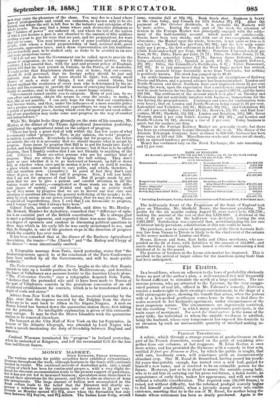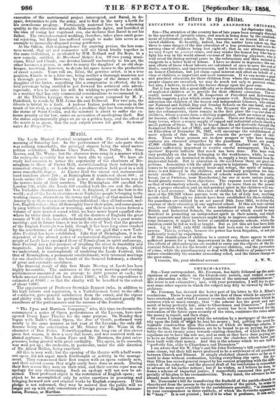gOr Orem.
In a broad farce, where an adhesion to the laws of probability obviously forms no part of the author's plan, a well-sustained riot will frequently be found sufficient to stimulate the mirth of a large audience. The nu- merous persons, who are attracted to the Lyceum, by the very exagge- rated portrait of real life, offered in Mr. Falconer's comedy, Extremes, receive a makeweight to their evening's entertainment, in the shape of a wild extravagant piece, showing the tumult that arises, when the jealous wife of a hen-pecked gentleman cornea home in time to find three fe- males secreted in her husband's apartment, under circumstances of the most suspicious nature. The circumstances are ingeniously contrived, but the resulting "row," in which many combatants participate, is the main cause of merriment. Too much for Good-nature is the name of the noisy trifle, the individual to whom the amiable weakness is ageribed, being the husband, whose easy temperament has exposed his domicile to an invasion by such an unreasonable quantity of mischief-making in- truders.
PARISIAN THEATRICALS.
A rubric, which through a strange cessation of productiveness on the part of the French dramatists, seemed on the point of vanishing alto- gether from our columns, at last reappears. M. Leon Gozlan is once more active, and has presented the Gymnase with a comedy in four acts, entitled Il faut sue Jeunesse se Pale, by which the public is taught, that wild oats, heedlessly sown, will sometimes yield an inconveniently abundant crop. One M. Raoul de Bonnefond, having passed his youth- ful years disteputably enough, has turned over a new leaf, gained for himself a new name, and is resolved to be an estimable person for the future. However, just as he is about to marry the amiable young lady, who is to aid him in carrying out his pious resolution, a faded (Uralic, an acquaintance of early days, makes her appearance, and will not vanish without a valuable consideration. The required sum (60,000 francs,) is raised, not without difficulty, but the reformed prodigal scarcely begins to feel himself comfortable, when a juvenile scamp starts into visible existence, asserting that he is the son of M. Raoul, his mother being the female whose retirement has been so dearly purchased. Again is the
execution of the matrimonial project interrupted, and Raoul, in de- spair, determines to join the army, and to find in the navy a berth for his unwelcome progeny. Fortunately maternal love is a redeeming quality in the otherwise detestable Mademoiselle Aglae, and horrified at the idea of losing her vagabond son, she declares that Raoul is not his father. The twice-frustrated wedding, therefore, takes place amid gene- ral rejoicing, but Raoul has suffered enough to make him serve as an example to immorally--disposed young gentlemen. At the Odeon, that training-house for aspiring genius, the less com- mon moral, that art and commerce will not blend kindly together in the same individual, is inculcated by MM. Rolland and Du Boys, in a new comedy, entitled, It Marchand Malgrd Lai. Of two young musi- cians, Rene and Claude, one devotes himself exclusively to his art, the other becomes a grocer, in order to marry the daughter of an old shop- keeper, resolving, however, to devote his spare hours to the production of sweet sounds. Years roll on, Rend, the genuine artist, is in a true position, Claude is in a false one, being neither a thorough musician nor a thorough grocer. However, by the marriage of the former with a daughter of the latter, something like a compromise is effected, the hy- brid personage being enabled to put forward his artistical side advan- tageously, when he rates his wife for wishing to provide for her child, in a manner that has only commercial considerations to recommend it. At the Theatre Lyrique there is a new opera composed by M. F. Godefroid, to words by MM. Jaime fits and Dubrcuil. For two acts, the libretto is trivial to a fault. A jealous Italian podesta conceals in the trunk of his rival, a young minstrel, a necklace: that has been stolen from the statue of Saint Cecilia, and the minstrel is about to suffer the ex- treme penalty of the law, under an accusation of sacrilegious theft. But the statue supernaturally plays an air on a golden harp, and the effect of the music is so great, that the real culprit avows his guilt. So termi- nates La Hope d' Or.



























 Previous page
Previous page